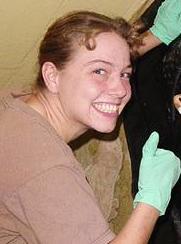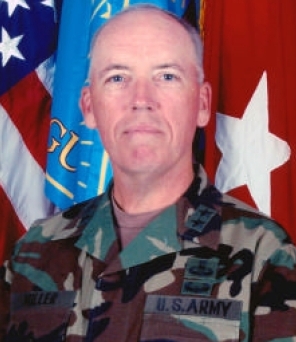
Janis Leigh Karpinski is a retired career officer in the United States Army Reserve. She is notable for having commanded the forces that operated Abu Ghraib and other prisons in Iraq in 2003 and 2004, at the time of the scandal related to torture and prisoner abuse. She commanded three prisons in Iraq and the forces that ran them. Her education includes a Bachelor of Arts degree in English and secondary education from Kean College, a Master of Arts degree in aviation management from Embry-Riddle Aeronautical University, and a Master of Arts in strategic studies from the United States Army War College.

Charles A. Graner Jr. is an American former soldier and corrections officer who was court-martialed for prisoner abuse after the 2003–2004 Abu Ghraib prisoner abuse scandal. Along with other soldiers of his Army Reserve unit, the 372nd Military Police Company, Graner was accused of allowing and inflicting sexual, physical, and psychological abuse on Iraqi detainees in Abu Ghraib prison, a notorious prison in Baghdad during the United States' occupation of Iraq.

Sabrina D. Harman is an American former soldier who was court-martialed by the United States Army for prisoner abuse after the 2003–2004 Abu Ghraib prisoner abuse scandal. Along with other soldiers of her Army Reserve unit, the 372nd Military Police Company, she was accused of allowing and inflicting physical and psychological abuse on Iraqi detainees in Abu Ghraib prison, a notorious prison in Baghdad during the United States' occupation of Iraq.

During the early stages of the Iraq War, members of the United States Army and the Central Intelligence Agency committed a series of human rights violations and war crimes against detainees in the Abu Ghraib prison in Iraq. These abuses included physical abuse, sexual humiliation, physical and psychological torture, and rape, as well as the killing of Manadel al-Jamadi and the desecration of his body. The abuses came to public attention with the publication of photographs by CBS News in April 2004, causing shock and outrage and receiving widespread condemnation within the United States and internationally.
About six months after the United States invasion of Iraq of 2003, rumors of Iraq prison abuse scandals started to emerge.

The Taguba Report, officially titled US Army 15-6 Report of Abuse of Prisoners in Iraq, is a report published in May 2004 containing the findings from an official military inquiry into the Abu Ghraib prisoner abuse. It is named after Major General Antonio Taguba, the report's principal author.
Steven Anthony Stefanowicz was involved, as a private contractor for CACI International, in the interrogations at Abu Ghraib prison in Iraq.

Geoffrey D. Miller is a retired United States Army major general who commanded the US detention facilities at Guantanamo Bay, Cuba, and Iraq. Detention facilities in Iraq under his command included Abu Ghraib prison, Camp Cropper, and Camp Bucca. He is noted for having trained soldiers in using torture, or "enhanced interrogation techniques" in US euphemism, and for carrying out the "First Special Interrogation Plan," signed by the Secretary of Defense, against a Guantanamo detainee.

Manadel al-Jamadi was an Iraqi national who was killed in United States custody during a CIA interrogation at Abu Ghraib prison on November 4, 2003. His name became known in 2004 when the Abu Ghraib scandal made headlines; his corpse packed in ice was the background for widely reprinted photographs of grinning U.S. Army specialists Sabrina Harman and Charles Graner each offering a "thumbs-up" gesture. Al-Jamadi had been a suspect in a bomb attack that killed 34 people, including one US soldier, and left more than 200 wounded in a Baghdad Red Cross facility.
Ghost detainee is a term used in the executive branch of the United States government to designate a person held in a detention center, whose identity has been hidden by keeping them unregistered and therefore anonymous. Such uses arose as the Bush administration initiated the War on Terror following the 9/11 attacks of 2001 in the United States. As documented in the 2004 Taguba Report, it was used in the same manner by United States officials and contractors of the Joint Interrogation and Debriefing Center at the Abu Ghraib prison in Iraq in 2003–2004.
Thomas M. Pappas is a former United States Army colonel who is a civilian intelligence officer with the Army's Training and Doctrine Command at Fort Eustis, Virginia.

In 2005, The New York Times obtained a 2,000-page United States Army investigatory report concerning the homicides of two unarmed civilian Afghan prisoners by U.S. military personnel in December 2002 at the Bagram Theater Internment Facility in Bagram, Afghanistan and general treatment of prisoners. The two prisoners, Habibullah and Dilawar, were repeatedly chained to the ceiling and beaten, resulting in their deaths. Military coroners ruled that both the prisoners' deaths were homicides. Autopsies revealed severe trauma to both prisoners' legs, describing the trauma as comparable to being run over by a bus. Seven soldiers were charged in 2005.
United States Army Captain Carolyn Wood is a military intelligence officer who served in both Afghanistan and Iraq. She was implicated by the Fay Report to have "failed" in several aspects of her command regarding her oversight of interrogators at Abu Ghraib. She was alleged by Amnesty International to be centrally involved in the 2003 Abu Ghraib and 2002 Bagram prisoner abuse cases. Wood is featured in the 2008 Academy award-winning documentary Taxi to the Dark Side.

The Fay Report, officially titled Investigation of Intelligence Activities at Abu Ghraib, was a military investigation into the torture and abuse of prisoners at the Abu Ghraib prison in Iraq. It was sparked by leaked images of Iraqi prisoners, hooded and naked, being mistreated obtained by the United States and global media in April 2004. The Fay Report was one of five such investigations ordered by the military and was the third to be submitted, as it was completed and released on August 25, 2004. Prior to the report's release, seven reservist military police had already been charged for their roles in the abuse at the prison, and so the report examined the role of military intelligence, specifically the 205th Military Intelligence Brigade that was responsible for the interrogation of prisoners at Abu Ghraib. General Paul J. Kern was the appointing authority for the report and oversaw the investigation. The chief investigators were Major General George Fay, whom the report is named after, and Lieutenant General Anthony R. Jones.

Samuel Provance is a former U.S. Army military intelligence sergeant, known for disobeying an order from his commanders in the 302nd Military Intelligence Battalion by discussing with the media his experiences at the Abu Ghraib Prison, where he was assigned from September 2003 to February 2004. After being disciplined for his actions, he eventually brought his case to the United States Government in February 2006, resulting in a congressional subpoena of the Secretary of Defense Donald Rumsfeld. The main points of his testimony are that military intelligence soldiers and contracted civilian interrogators had abused detainees, that they directed the military police to abuse detainees, the extent of this knowledge at the prison, and the subsequent cover-up of these practices when investigated.

Donald Ryder is a retired major general of the United States Army who served as United States Army Provost Marshal General from 2003 to 2006.
Damien M. Corsetti was a soldier in the United States Army. As part of the Army's investigation into prisoner abuse at Bagram, Corsetti was charged with dereliction of duty, maltreatment, assault and performing an indecent act with another person. PFC Corsetti was later found not guilty of all charges. At the time Corsetti was a specialist in the 519th Military Intelligence Battalion, serving under Lieutenant Carolyn Wood.

The United States Army's 205th Military Intelligence Brigade and its three battalions have a history dating back to World War II. The brigade has been in a continuous active service since 1944. The brigade was constituted on 12 July 1944 in the Army of the United States as the 205th Counter Intelligence Corps Detachment. It was allotted to the Regular Army on 6 October 1950. The unit served during World War II in Northern France, the Rhineland, Ardennes-Alsace and Central Europe. It was reorganized and redesignated as the 205th Military Intelligence Detachment on 25 June 1958.

The 302nd Military Intelligence Battalion, whose unit crest portrays the "sly fox", evolved from the 3252d Signal Service Company which was activated in England on 1 April 1944.
A number of incidents stemming from the September 11 attacks have raised questions about legality.












